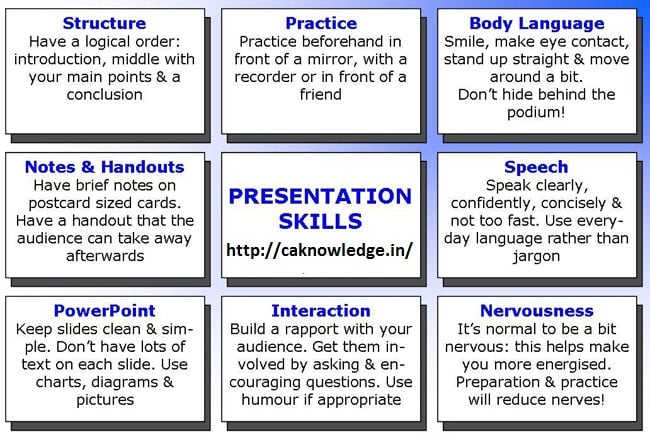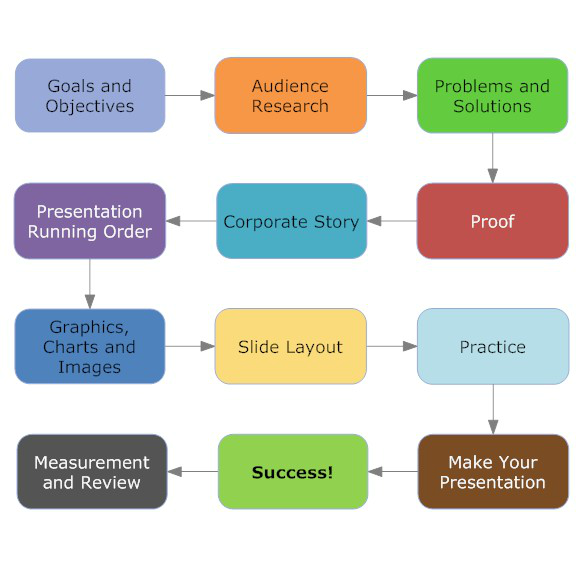CS Executive ResultCS Professional Result
If you like this article then please like us on Facebook so that you can get our updates in future ……….and subscribe to our mailing ”freely“
Effective Presentation Skills
Effective Presentation Skills are an important part of professional life. As more work becomes teamwork, what you know is often as important as how well you communicate it. It takes real presentation skills to translate this technology. It has been observed that the young people are making high- stakes presentations to the most senior executives in their companies. One of the quickest ways to freeze your progress up the ladder is to foul up a big presentation. The tips below are based on insights from the best experts around, to help you prepare for your next presentation to senior management. The best presentation may seem effortless, but they are the results of well-designed techniques and lots of practice.
Effective Presentation Skills For – CA, CS, CMA Students.
1 Have clear recommendation/action step
Effective presentations don’t end with nodding heads and polite applause. They end with action. The most important question to ask before any presentation is, “What do I want my audience to do and how do I convince them to do it?”
2 Understand your audience
It is hard persuade an audience when you don’t know in it their backgrounds, interests, goals, pet peeves. It is sometimes called CYA: Cover Your Audience. You should know as much as you can about who you’re speaking to and what are their expectations. Where are they positioned on the issue? What’s their knowledge level? What are their demographics and cultures?
3 First ( and last) impressions are everything
Every presentation guru makes the same point: The two most important of your presentation on the first 30 and the last 15 seconds. Everything else is, no matter how substantive, is utterly forgettable if the presentation starts or end badly. People make a decision in the first 30 secondsabout whether they are going to listen to you. A powerful close leaves the audience with something of value and relates directly to the opening. If you opened with a story, complete the story at the close. If you opened with a statistic or quote, restate it at the end. People should walk away with something specific in mind. A final point on which the experts agree and which almost no one follows, is that presenters should always finish early. It creates positive feelings in the audience that can influence how people feel about your message.
4. Keep it simple
Make Your presentations shorter and more can did. Remember the 80/20 rule: 80% value will be created by 20% efforts
5. Perform, don’t present
It’s comforting to think that if you master the substance of a presentation by developing a compelling argument, marshalling great evidence, and creating simple overheads, you’ll be guaranteed to attract your audience. Presenters should look one person square in the eye and hold that contact for at least five seconds, or one complete thought. It’s almost like having mini-conversations with specific members of the audience.
6. Handling Objectives
How do you handle a hostile member of the audience? The first rule is to disagree without being disagreeable. Don’t pick a fight. Practice Empathic Listening – repeat and rephrase the questions, including the emotions that accompanied it. This way the questioner knows you have heard him. That alone can defuse some negativity
7. Do through homework
The simple truth about presentations, like almost everything else in business, is that the only way to get batter is to practice. What’s painful is that most people only have one way to practice in public, by giving presentations. Prepare not just the presentation but also insight on the topic. You should be the undisputed expert in the room on the specific topic irrespective of the levels of people present in the audience
8. Learn how to use multimedia
The chosen media for presentation in most organisation is PowerPoint. Learn how to show animation (in that points come one after another on a single slide), learn colour combinations etc. Be cautions also of the things that can go wrong with technology. Laptop battery is charged, you know how to connect projector, you are carrying a spare copy on a pen drive etc. Decide between hand-outs and screen presentations and the use of props. Learn how to make charts – waterfall diagram is especially powerful while showing data analysis. Thanks for read this article I hope these tricks for “effective presentation skills” improve your presentation Skills.

